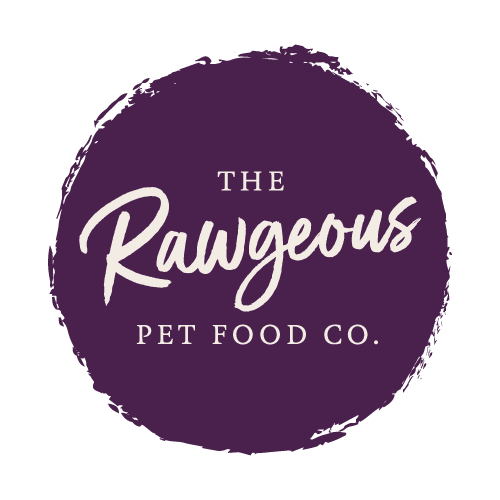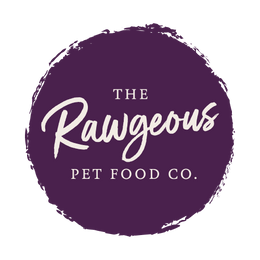RAWGEOUS Behaviour!
Diet is an important factor to consider when approaching behaviour modification from a holistic perspective. While there are many different approaches to behaviour modification, a holistic approach considers the whole dog - including their physical, emotional, and nutritional needs - in order to address the underlying causes of their behaviour problems.
Feeding your dog a balanced, nutritious diet is an essential part of a holistic approach to behaviour modification. A diet that is high in processed foods, artificial additives, and fillers can contribute to physical discomfort, digestive issues, and mood imbalances, which can all impact behaviour.
On the other hand, a diet that is rich in whole, natural foods can provide the nutrients your dog needs to maintain optimal physical and emotional health. A balanced, species- appropriate diet can help regulate mood, energy levels, and cognitive function, which can all impact behaviour.
Here are some specific ways that diet can impact behaviour, and how a holistic approach to behaviour modification can address these factors:
- Nutritional deficiencies: A diet that is deficient in certain nutrients, such as essential fatty acids, amino acids, and vitamins, can contribute to behaviour problems. For example, a deficiency in tryptophan, an amino acid that is important for the production of serotonin, can lead to anxiety and aggression.
A holistic approach to behaviour modification would involve identifying and addressing any nutritional deficiencies in your dogs diet. This may involve switching to a diet that is richer in whole, natural foods, or supplementing with specific nutrients that may be lacking.
- Food intolerances: Some dogs may have intolerances or allergies to certain foods, which can contribute to physical discomfort and mood imbalances. For example, a dog that is intolerant to wheat may experience digestive issues and irritability.
Speak with a qualified nutritionist or your vet to identify any food intolerances or allergies your dog may have and eliminate those foods from their diet. This can help reduce physical discomfort and mood imbalances, which can in turn improve behaviour.
- Blood sugar imbalances: Diets that are high in carbohydrates can contribute to blood sugar imbalances, which can impact behaviour. When blood sugar levels are unstable, dogs may experience mood swings, irritability, and hyperactivity.
You can regulate your dog's blood sugar levels by feeding them a diet that is lower in carbohydrates and higher in protein and healthy fats. This can help stabilize their mood and energy levels, which can in turn improve behaviour.
But specifically, why do I recommend feeding rawgeous to my clients who are working with me to help change their dog’s behaviour?
1. Reduced Aggression
Research has shown that dogs fed a raw food diet exhibit lower levels of aggression than those fed a conventional diet. This may be due to the fact that raw food contains a more balanced nutrient profile, including higher levels of protein and fat, which can help regulate mood and behaviour.
One study published in the Journal of Animal Science found that dogs fed a raw meat diet showed lower levels of aggression towards humans and other dogs than those fed a kibble- based diet. The study also found that the raw-fed dogs were more socially interactive with their human caretakers.
2. Improved Trainability
Feeding your dog a raw food diet can also improve their trainability. Raw food contains higher levels of essential fatty acids, which are important for cognitive function and brain development. This can make it easier for dogs to learn new commands and retain information.
A study published in the Journal of Nutrition found that dogs fed a high-protein, low- carbohydrate diet (similar to a raw food diet) showed improved cognitive function and were more responsive to training commands than those fed a low-protein, high-carbohydrate diet.
3. Reduced Hyperactivity
Many dog owners report that feeding their pets a raw food diet results in reduced hyperactivity and increased calmness. This may be due to the fact that raw food is free from additives and preservatives that can contribute to behavioural problems.
One study published in the Journal of Applied Animal Welfare Science found that dogs fed a raw meat diet were less likely to exhibit hyperactive behaviour than those fed a conventional diet. The study also found that the raw-fed dogs had fewer gastrointestinal problems, which can also contribute to hyperactivity.
4. Reduced Anxiety
Feeding your dog a raw food diet can also help reduce anxiety. Raw food contains higher levels of tryptophan, an amino acid that is a precursor to serotonin, a neurotransmitter that helps regulate mood and behaviour. Serotonin is also known to have a calming effect on the brain.
One study published in the Journal of Veterinary Behaviour found that dogs fed a raw food diet showed lower levels of anxiety than those fed a conventional diet. The study also found that the raw-fed dogs had lower levels of cortisol, a stress hormone that can contribute to anxiety.
Feeding your dog a raw food diet has several positive impacts on their behaviour, including reduced aggression, improved trainability, reduced hyperactivity, and reduced anxiety. These benefits may be due to the balanced nutrient profile of raw food, which can help regulate mood and cognitive function. However, it is important to consult with your veterinarian before making any significant changes to your dog's diet.
In conclusion, diet is an important factor to consider when approaching behaviour modification from a holistic perspective. A balanced, nutritious diet can provide the nutrients your dog needs to maintain optimal physical and emotional health, which can impact behaviour. A holistic approach to behaviour modification involves identifying and addressing any nutritional deficiencies, food intolerances, or blood sugar imbalances that may be contributing to behaviour problems. By taking a holistic approach, you can address the underlying causes of your dog's behaviour problems and help them achieve a happier,
healthier life.
healthier life.



